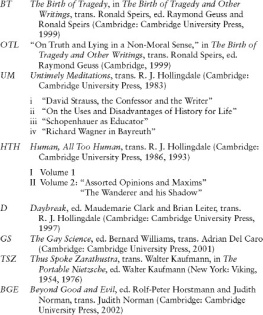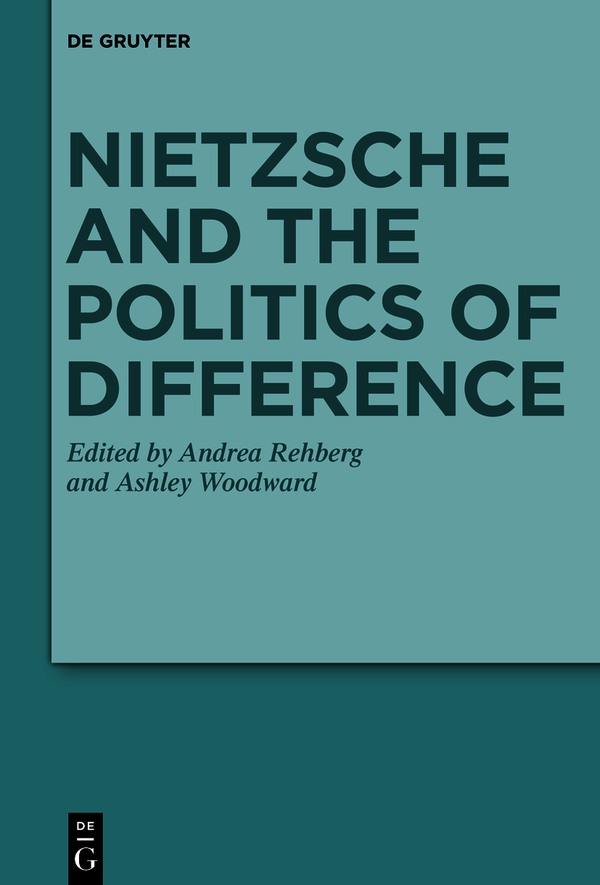ISBN 9783110688382
e-ISBN (PDF) 9783110688436
e-ISBN (EPUB) 9783110688450
Bibliographic information published by the Deutsche Nationalbibliothek
The Deutsche Nationalbibliothek lists this publication in the Deutsche Nationalbibliografie; detailed bibliographic data are available on the Internet at http://dnb.dnb.de.
2022 Walter de Gruyter GmbH, Berlin/Boston
Abbreviations
Primary Nietzsche sources are cited in the chapters by abbreviation according to the standard conventions listed here, except where older or non-standard editions are being used. Nietzsches works are typically cited by section number and, in the cases of Ecce Homo, On the Genealogy of Morals and Twilight of the Idols, an additional reference to the chapter title or essay number (see below). References to Thus Spoke Zarathustra include the part number and chapter title (often abbreviated), for example, Z I, Reading. Prefaces of works are referenced by a Preface after the abbreviated title, for example, TI Preface. All passages from Nietzsches Nachlass are cited from KSA or KGW, as KSA/KGW, volume number, manuscript number, and then fragment number in brackets, for example, KSA 7, 5 [103]. In some cases, especially for notes running across several pages, the page number of KSA/KGW was added. Nietzsches letters are cited according to the following scheme: Bf. to/from sender/recipient, date, KGB section/volume number, Bf. number and, for long letters, occasional page numbers, for example, Nietzsche to Franz Overbeck, 22/06/1880, KGB III/1, Bf. 33. The English translations of Nietzsches works used in the chapters are listed in the respective bibliographies. At times, alternative translations are used, but these are always distinguished by different abbreviations, for example, GM for the Clark and Swensen translation, GoM for the Kaufmann and Hollingdale translation. Below, those of Nietzsches texts cited in German are also included.
A
The Antichrist
ASC
Birth of Tragedy, Attempt at Self-Criticism
BAW
Historisch-kritische Gesamtausgabe: Werke
BGE
Beyond Good and Evil
BT
The Birth of Tragedy
BWN
Basic Writings of Nietzsche
COK
On the Concept of the Organic since Kant
CW
The Case of Wagner
D
Daybreak
DS
David Strauss, the Writer and the Confessor [UM I]
EH
Ecce Homo [EH Preface; Wise; Clever; Books: Z, CW; Destiny]
ENB
Writings from the Early Notebooks
FEI
On the Future of Our Educational Institutions
GM
On the Genealogy of Morals (cited by essay number followed by section number)
GS
The Gay Science
GSt
The Greek State
GT
Die Geburt der Tragdie
HC
Homers Contest
HCP
Homer and Classical Philology
HH
Human All Too Human
HH II
Human All Too Human II
HkP
Homer und die klassische Philologie
HL
On the Uses and Disadvantages of History for Life [UM II]
JGB
Jenseits von Gut und Bse
KGB
Nietzsche Briefwechsel: Kritische Gesamtausgabe
KGW
Nietzsche Werke: Kritische Gesamtausgabe
KSA
Smtliche Werke: Kritische Studienausgabe
LNB
Writings from the Late Notebooks
NCW
Nietzsche contra Wagner
PPP
The Pre-Platonic Philosophers
PTAG
Philosophy in the Tragic Age of the Greeks
SE
Schopenhauer as Educator [UM III]
SLN
Selected Letters of Friedrich Nietzsche
TI
Twilight of the Idols [TI Socrates, Reason, Fable, Skirmishes, Ancients]
TL
On Truth and Lie in an Extra-Moral Sense
UM
Untimely Meditations
UO
Unfashionable Observations
WP
The Will to Power
WS
The Wanderer and His Shadow
Z
Thus Spoke Zarathustra
[Z, Prologue; Z I, Metamorphoses, Hinterworldly, Passions, War, Idol, Goals, Neighbour; Z II, Isles, Self-Overcoming, Poets, Redemption; Z III Virtue, Tables]
Introduction
Andrea Rehberg
Andrea Rehberg teaches Philosophy at Newcastle University. She co-edited The Matter of Critique: Readings in Kants Philosophy (2000), edited Nietzsche and Phenomenology (2018), and she has published on Kant, Nietzsche, Heidegger, Lyotard and Nancy. She is on the editorial board of the Journal of the British Society for Phenomenology, as well as on the executives of several learned societies in continental philosophy, including the Friedrich Nietzsche Society. Her main research interests are Kant, Nietzsche, Heidegger and Deleuze.
Ashley Woodward
Ashley Woodward is Senior Lecturer in Philosophy at the University of Dundee. He is a member of the executive committee of the Friedrich Nietzsche Society. His publications on Nietzsche and his legacy include the books Nihilism in Postmodernity (Davies Group, 2009), Understanding Nietzscheanism (Acumen, 2011), the edited volume Interpreting Nietzsche (Continuum, 2011) and articles in journals including Nietzsche-Studien, Continental Philosophy Review and The Agonist.
We live in a time when the suppression of difference seems to be the express aim of much political activity. Even where it is not the explicit aim, it is a not-undesired side-effect of a politics of equalisation, as has been observed across the globe, from the UK and the Trump-era US to parts of Eastern Europe, China, India, Russia and so on. Given that today we are faced with a host of political challenges of domination and resistance, the question raised in this volume is how Nietzsche helps us to think through and to address some of the problems with which we are faced today, but also how his writings complicate our desire for swift solutions to seemingly intractable problems: how to resist slavishness in thought and action, how to maintain hard-won civil liberties and rights in the face of encroaching hegemonic discourses, practices and forces, or how to counteract global environmental degradation; in short, how to oppose totalitarian movements of homogenisation, universalisation and equalisation, and instead to affirm, both politically and ontologically, a culture of difference.
All too often difference is understood as that which merely pertains between given entities or identities but, starting with Nietzsche, the thought of an originary difference that is irreducible to identity and, importantly, constitutive of identity gains traction. At the same time, the affirmation of difference as plurality or multiplicity goes hand in hand with difference as an ontological issue. The Nietzschean thought of difference thus marks the intersection of the purely ontological and the political.
Many recent and contemporary political philosophers and theorists distinguish between the political and politics, where the former encompasses aspects of a transcendental or ontological nature, whereas the latter concerns the empirical field in which the political articulates itself. The contributors to this collection variously cover aspects of both, either by concentrating solely on Nietzsches thoughts relevant to these aspects or, just as often, by interpreting Nietzsches works through the lens of one or more key figures in contemporary continental philosophy, such as Alain Badiou, Gilles Deleuze, Michel Foucault, Jacques Rancire or Bernard Stiegler. In fact, one of the outstanding features of the present collection is the sheer breadth of topics covered, from human rights, migrants, fake news and populism, to the monstrous, the idiot and the question of space, to name but a few.
Although, on the one hand, Nietzsche was often deeply critical of politics and politicians, on the other hand, he advocated a great politics (










